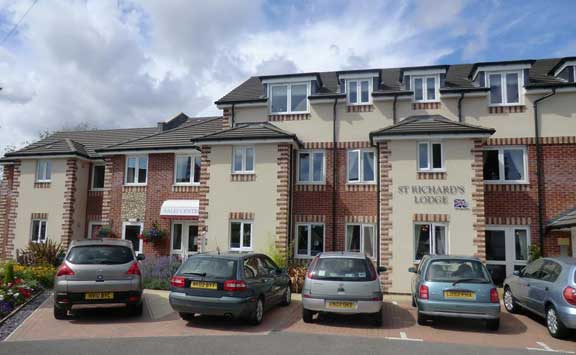… Often in sites with dismal resale values

At McCarthy and Stone’s Oak Court, in Withington, Manchester, ground rents have gone up 88% this year as part of the lease term’s 23-year review. Meanwhile, resale values of the flats have gone down … as at so many retirement sites
Thousands of pensioners living in older retirement properties are facing a massive hike in ground rents: 88 per cent is not unusual.
The older leases of mass retirement housing builder McCarthy and Stone are kicking in with huge hikes in ground rents.
Ground rents at Churchill sites rise every seven years with RPI, also creating significant rises.
www.BetterRetirementHousing.com reports the case of Megan Bennett, 73, who lives at Oak Court in Withington, Manchester, a McCarthy and Stone site of 37 flats built in 1994.
She bought the property as a resale at £72,000 (more below).
Her ground rents rose this year from £310 to £583.89p, a staggering 88 per cent increase.
“When I bought the property two years ago my solicitor did not mention ground rent at all,” says Mrs Bennett. “I lived in a leasehold house before, but bought the freehold. The ground rents for houses around Stockport were £36 a year.
“The ground rents we are all facing are a massive increase for pensioners, many of whom had no idea it was coming.”
It is a similar story at St Richard’s Lodge, Chichester, a Churchill site.
Rosemary Marshall, 76, has seen the ground rent of her one-bedroom flat rise from £550 to £655.86p a year. A 19% increase.
The ground rents are set to be reviewed every seven years throughout the 125-year lease.
A neighbour of Mrs Marshall, with a two-bedroom flat, is paying £715.88p a year in ground rent – the sort of rates seen in prime central London.
The freehold of St Richard’s Lodge was sold in 2013. Churchill retain the headlease, which means it can appoint its own property management arm Millstream to run the site.

At Churchill’s St Richard’s Lodge, ground rents have risen by 18 per cent this year, as part of the lease review every seven years
Mrs Marshall paid £235,000 for her flat in 2008, which she bought after being widowed.
“We have a great community here, and the neighbours are very nice people,” she says.
“That balances the financial stresses. We feel that we have to watch Churchill all the time when it comes to the charges.
“If the ground rent goes on like this, and the other charges, what is it going to be like in ten years time when I am 86? How am I going to be able to deal with financial problems like this at that age?”
Oak Court follows the usual older McCarthy and Stone retirement picture:
The freeholder here is Fairhold, part of Vincent Tchenguiz’s much diminished empire, and the manager as usual is FirstPort (formerly Peverel). Tchenguiz’s interests account for the bulk of FirstPort’s business.
Ultimately the freehold belongs to the Tchenguiz Family Trust, based in the British Virgin Islands.
However, pension fund investor Rothesay Life, established by Goldman Sachs and other investors, has a £1.8 billion debenture on the ground rent income.
This leaves the Tchenguiz interests with only the income from redevelopment, insurance commissions, consent fees, subletting fees and the rest.
Both income streams are gathered by Estates and Management Limited.
Robin Mackay, of Wyndham Court in Yeovil, has been warning of this situation for some time.
He said: “Retirement ground rents should be included in the review of onerous ground rents launched by Sajid Javid, the Communities Secretary.”
Land Registry resales at Oak Court, which was completed in 1994, tell a familiar story of plummeting values in retirement housing:
Flat 1
2016-12-02 £45,000
2002-03-14 £49,000
1996-01-26 £53,500
Flat 11
2017-05-26 £57,500
2012-06-01 £54,000
Flat 15
2016-05-31 £58,500
1995-01-30 £49,000
Flat 18
2015-08-13 £50,000
2010-06-28 £77,950
1999-10-22 £45,000
Flat 20
2014-03-28 £48,000
2007-03-16 £87,000
Flat 22
2016-10-07 £72,000
2010-03-30 £99,950
2000-04-12 £60,000
Flat 28
2003-08-06 £68,000
2002-04-11 £43,500
Flat 29
2009-06-15 £88,000
1995-01-16 £57,500
Flat 30
2004-05-05 £92,500
1995-04-28 £49,500
Flat 33
2016-03-15 £38,000
2015-11-30 £23,500
2006-02-24 £83,000
Flat 35
2016-12-07 £63,000
2004-09-01 £110,000
1998-03-24 £52,700
Flat 37
2017-03-27 £75,000
2011-12-02 £80,000
Flat 38
2002-04-19 £73,000
2000-12-13 £71,000
Flat 4
2016-04-22 £56,000
2010-03-26 £45,000
Flat 6
2012-07-02 £66,000
2004-05-21 £120,000
Flat 8
2001-03-29 £60,000
1995-03-24 £69,000
Flat 9
2014-12-17 £55,000
2000-06-23 £41,000
The trajectory is also downwards at St Richard’s Lodge:
Flat 10
2016-06-09 £152,500
2011-11-22 £187,950
Flat 16
2012-05-04 £90,000
2010-02-26 £199,950
Flat 17
2016-01-19 £150,000
2011-07-06 £169,950
Flat 21
2017-03-24 £140,000
2009-08-14 £199,950
Flat 24
2014-10-09 £165,000
2009-11-06 £219,950
Flat 27
2017-03-16 £177,250
2010-05-28 £209,950
Flat 32
2015-03-27 £159,995
2011-10-27 £187,950
Flat 33
2016-03-18 £149,995
2011-05-20 £169,950
Flat 37
2016-03-17 £170,000
2009-02-05 £195,950
























Am I correct in believing that Churchill share some of the directors as were directors of the the “Old” McCarthy & Stone at the time of their well publicised financial problems ?
It is said that Estates & Management collect the income streams for Oak Court.
Yet Estates & Management’s last accounts which show a fall in profits from 6,209,954 pounds to 306,769 pounds states “There were no employees during the year other than directors”
So even though it says Estates & Management on the demands and payments are made to Estates & Management, if Estates & Management have no employees who is it that is really trading?
When it comes to communal electricity charges, why are residents in Churchill developments and the newer(non Firstport managed) McCarthy & Stone paying 5% VAT on communal electricity, whilst residents in older McCarthy & Stone developments managed by Firstport are paying 20% VAT?
Same old names eh Michael?
The root of the problem here is that leaseholders were not warned of the correction to their ground rent
It will be argued that as pensions are triple linked that over the period from the last rent review the ground rent as a proportion of the state pension will have fallen but that is not much comfort if you don’t know the terms of your lease or how to calculate the adjustment. For many the state pension will only form part of their income and not all pension income rises with inflation
As it was disclosed at outset and formed part of the consideration offeeed and agreed between he developer and purchaser for granting the lease it cannot be argued as onerous or unfair – but a simple change in the legislation to make it clear that based on inflation to date the ground rent will be £xxx in YY years time would help
If the Freeholder cannot give a valid reason for making Ground Rent charges then they should go, and the same with Exit Fees.
By that I mean they should detail the costs they incurr and wish to recover, not just say we make the charge because it is a condition of the Lease.
That excuse is no longer acceptable.
Though it is probably what LEASE would say.
What about Commonhold – that would get rid of all these problems, but I find it hard to imagine a Tory government going for that.